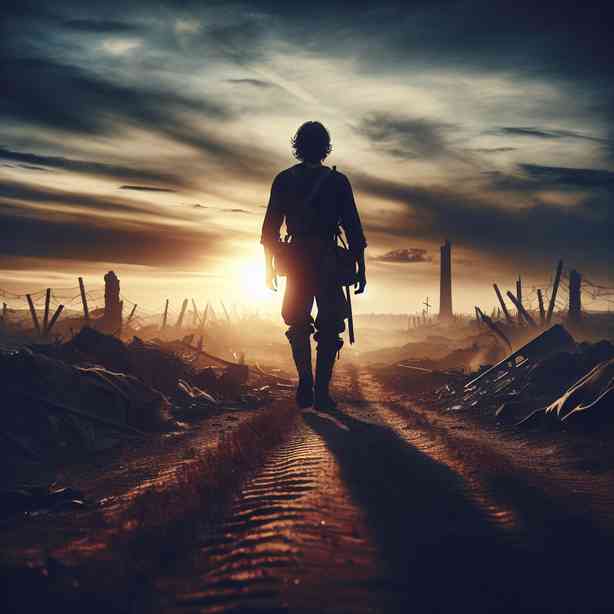
In storytelling, the concept of a hero walking away often symbolizes a deeper exploration of personal choice, sacrifice, and the journey of self-discovery. This narrative device resonates across various mediums, be it literature, film, or even real-life situations, where the protagonist takes a momentous decision to turn their back on expectations, duties, or the very ideals they once upheld. Understanding the nuances of this action can help us appreciate the intricacies of character development and thematic depth that enriches storytelling in significant ways.
At the core of the hero’s journey is the quest for identity. The archetypal hero often embarks on an adventure driven by noble goals, such as saving a community or defeating an antagonist. However, as the hero progresses, they are frequently confronted with the harsh realities of their chosen path. They encounter moral dilemmas, personal loss, or the burden of expectations that weigh heavily upon them. It is at these crossroads that the symbolism of the hero walking away becomes profound. By stepping away from the established narrative, the hero reclaims their agency and begins to question the very foundations of their motivations.
The act of walking away isn’t merely physical; it represents an emotional and psychological shift. For instance, consider a well-known hero in literature or film who decides to leave behind their comrades in the heat of battle, driven by the realization that their presence may do more harm than good. In such scenarios, the act of leaving can be misinterpreted as cowardice, yet it frequently manifests as a courageous acknowledgment of one’s limitations. This nuanced portrayal urges the audience to reconsider conventional notions of heroism and bravery.
Each story that explores this theme invites us to reflect on the cost of heroism. The sacrifice associated with truly understanding one’s role can often lead to feelings of isolation and regret. Heroes who choose to walk away frequently grapple with the weight of their decisions, questioning if they were right to abandon their duties, responsibilities, or support systems. This inner turmoil adds layers of complexity to their characters and enhances the emotional engagement of the narrative. The audience witnesses not just the hero’s physical journey, but a profound internal struggle, reflecting our own life experiences where we have faced choices that demand introspection.
There’s also a transformative aspect to the hero’s decision to walk away. This choice often catalyzes personal growth, leading the character to newfound perspectives and realizations. For example, a hero may leave their allies not out of disdain but out of a desire to understand themselves better. By taking a step back, they create space for self-reflection, allowing them to reassess their values, priorities, and desires. This journey of self-discovery, although painful, often culminates in a more rounded and self-aware individual. Through their journey away from the expectations of others, the hero ultimately finds strength in vulnerability and clarity in chaos.
The audience’s reaction to such decisions can also vary widely. While some may empathize with the hero’s struggle and applaud their bravery, others may view the act as betrayal. This dichotomy in audience perception demonstrates the multifaceted nature of human experiences and the importance of personal choice. It further encourages dialogue around the complexities of heroism and the broader societal implications of abandoning traditional narratives. Heroes are often celebrated, but their journeys remind us of the rich textures that lie beneath the surface.
When a hero chooses to walk away, it invites a conversation about personal autonomy and the societal pressures that shape our decisions. In our lives, we frequently find ourselves in situations where we feel obligated to meet the expectations of others, be it in our careers, family dynamics, or social interactions. Yet, the stories of those heroes who take a stance, who choose to walk away, resonate deeply with us. They serve as a reminder that it is permissible to prioritize self-care and personal growth, even if it means stepping away from conforming to norms or abandoning a role we are expected to play.
Furthermore, these narratives often explore themes of redemption and the possibility of returning. The hero’s journey does not have to end with their departure; instead, it can lead to a more profound understanding of their purpose and a renewed drive to contribute positively to the world. Some heroes eventually return to reclaim their responsibilities, but now with a transformed perspective that enriches their contributions and allows for deeper connections with those around them. This cyclical pattern enhances the overall message of resilience and emphasizes that every choice made, including the choice to walk away, can contribute to a larger journey of understanding and growth.
The stories that align with the theme of “the hero walking away” strike a chord not just because of their plotlines but due to their inherent relatability. Many of us have had moments when we felt the urge to walk away from situations that no longer served us—whether in friendships, workplaces, or relationships. These experiences inform our understanding of boundaries and highlight the importance of emotional intelligence in navigating our lives. By seeing our struggles reflected in the journeys of heroes, we feel validated and inspired to pursue our paths, reminding us that it is okay to prioritize ourselves.
In conclusion, the motif of a hero walking away serves as a powerful narrative mechanism that allows storytellers to delve into the complexities of the human experience. Rather than signaling a loss of purpose or courage, this act can represent profound benefits in personal development and self-awareness. It challenges the traditional ideals of heroism and invites us to reconsider the choices we make in our lives. As we reflect on the heroes we admire—whether fictional or real—we are reminded that the most courageous act may often be to turn away, seek understanding, and, ultimately, return stronger and more equipped to face the world. This intricate exploration of heroism not only enriches storytelling but also serves as a poignant reminder of our own journeys within the tapestry of life.


